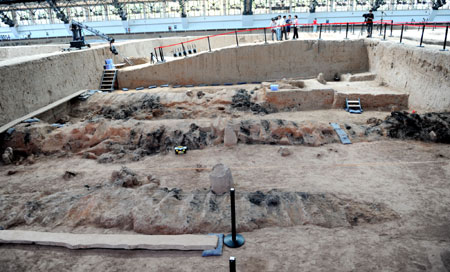The unearthing of more terracotta warriors is such a treat for one tourist from Hubei that he has decided to return to Xi'an every summer for the next five years.
|

|
|
Archaeologists work at the excavation site of No. 1 pit of the Terra-cotta Warriors and Horses of Emperor Qin Shihuang, in Xi'an, capital of northwest China's Shaanxi Province, June 13, 2009. [Xinhua] |
"I want to witness each step of the excavation of the Qin terracotta warriors and horses," Sun Yunfeng from Enshi told China Daily Sunday.
During the first two days of excavation, which began again on Saturday and is ongoing during visiting hours, archaeologists found two chariots standing close together, each with four horses.
"It is the first time we've unearthed such an arrangement of chariots in the pit. The chariots we found before had a dozen warriors in between," said Cao Wei, deputy curator of the Qinshihuang Terracotta Warriors and Horses Museum.
They also found a warrior with color paint still on his face, arm and chest.
"From the results made in the first two days of the excavation, we think there are some 150 pottery warriors, two chariots and eight horses in this section," said Liu Zhancheng, an archaeologist at the museum.
|

|
|
Photo taken on June 13, 2009 shows the excavation site of No. 1 pit of the Terra-cotta Warriors and Horses of Emperor Qin Shihuang, in Xi'an, capital of northwest China's Shaanxi Province. [Xinhua] |
In another part of the excavation area, archaeologists found a painted wooden ring with colors still bright after more than 2,000 years in the earth.
"Although there is little possibility to unearth well-protected painting figures as Pit No 1 was destroyed by fire and water in ancient times, it is still possible to find colorful painting on some parts of high-ranking figures," Xu said.
It was the third excavation in the pit - the first and largest of three pits at the site near Xi'an, capital of Shaanxi province -since 1974 when the terracotta army was discovered.
(China Daily, June 15, 2009)